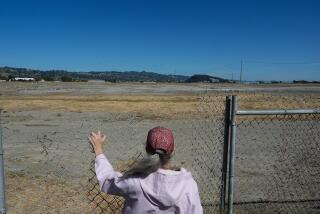Coal ash -- a Tennessee wake-up call
- Share via
Coal burning is to the environment what cigarette smoking is to the body, a point brought home with startling clarity last month when an earthen dam holding back a vast reservoir of coal ash at a Tennessee power plant ruptured, turning the area nearby into a landscape resembling Mordor.:Mordor.png The sludge buried a dozen homes, left residents anxious about the safety of their water supply and, we hope, opened Americans’ eyes about the dangers posed by our poor energy choices.
Of all the environmental and health problems caused by coal -- mining it destroys rivers and blackens miners’ lungs, and burning it emits climate-changing gases, toxic pollutants and heavy metals -- perhaps the least recognized until recently was the solid waste it generates. The Kingston Fossil Plant in Harriman, Tenn., had a pile of ash covering more than 100 acres and rising 65 feet, the product of more than 50 years of operations. More than a billion gallons of it poured out Dec. 22, marking the nation’s worst coal plant spill.
Just as a devastating oil spill from a Santa Barbara platform in 1969 alerted California and the country to the dangers of offshore drilling, it is to be hoped that the Kingston plant spill adds urgency to our quest for cleaner power sources. But there are more immediate lessons. Because coal ash storage was until now a relatively obscure issue, power plants have never been properly regulated by the federal government. That has to change.
In 1980, Congress asked the Environmental Protection Agency to study whether coal ash should be regulated as a hazardous waste. The EPA made no ruling until 1993, when it said there was no need. It tentatively reversed itself in 2000, but then backed down in the face of industry opposition. That means states are left to regulate ash as an industrial waste, with some treating it more seriously than others.
Coal ash contains dangerous metals such as arsenic, lead and mercury. Last week, the EPA tested water samples near the Tennessee spill and found arsenic at more than 100 times the acceptable level; prolonged exposure to such heavy concentrations has been shown to cause cancer. Sounds hazardous to us.
Unfortunately, coal will be with us for some time to come. Even if the United States turns clean power into a top priority, it will take decades to wean ourselves off a fossil fuel that generates about half of our electricity. That means we need to work harder on reducing its environmental impacts, and properly regulating coal ash as a hazardous waste is one place to start. If it raises the price of coal power, and thus makes renewable power more competitive, all the better.
More to Read
A cure for the common opinion
Get thought-provoking perspectives with our weekly newsletter.
You may occasionally receive promotional content from the Los Angeles Times.






